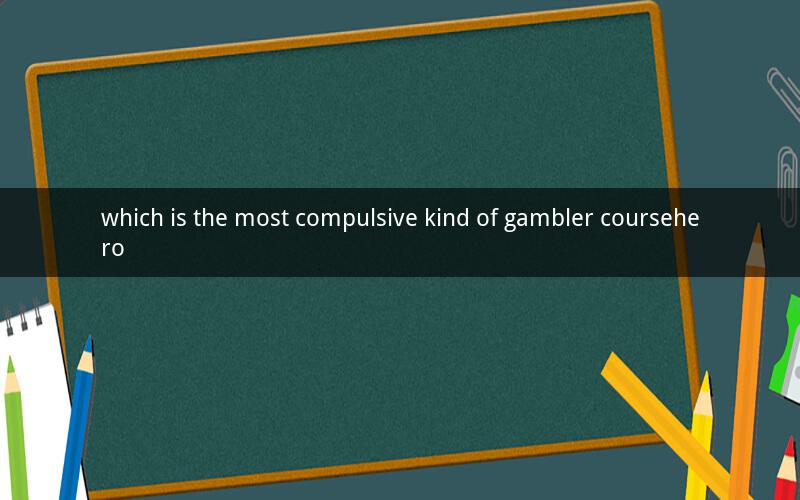
Directory
1. Introduction to Compulsive Gambling
2. Types of Compulsive Gamblers
2.1. The Impulsive Gambler
2.2. The Social Gambler
2.3. The Problem Gambler
2.4. The Pathological Gambler
3. Characteristics of Compulsive Gamblers
4. The Impact of Compulsive Gambling
5. Treatment and Support for Compulsive Gamblers
6. Conclusion
Introduction to Compulsive Gambling
Compulsive gambling, also known as gambling addiction, is a condition characterized by an uncontrollable urge to gamble despite negative consequences. It is a significant public health issue that affects millions of individuals worldwide. Understanding the various types of compulsive gamblers and their characteristics is crucial for effective treatment and support.
Types of Compulsive Gamblers
2.1. The Impulsive Gambler
The impulsive gambler is someone who engages in gambling without much planning or consideration of the risks involved. They often act on impulse and may not have a specific goal in mind when they start gambling. This type of gambler may experience intense emotions and a strong urge to keep gambling, even when they are losing money.
2.2. The Social Gambler
The social gambler is someone who enjoys gambling as a social activity. They may gamble with friends or family and often do so in a controlled manner. However, they may develop a problem if they start to gamble more frequently or if they begin to feel the need to gamble to socialize.
2.3. The Problem Gambler
The problem gambler is someone who has developed a gambling problem but may not yet meet the criteria for a full-blown addiction. They may experience some of the negative consequences of gambling, such as financial difficulties or strained relationships, but may not be willing to seek help or change their behavior.
2.4. The Pathological Gambler
The pathological gambler is the most compulsive type of gambler. They have a severe gambling addiction that significantly impacts their lives. Pathological gamblers may experience intense cravings for gambling, lie about their gambling activities, and continue to gamble despite knowing the negative consequences.
Characteristics of Compulsive Gamblers
Compulsive gamblers often share certain characteristics that can help identify their condition. These include:
- Preoccupation with gambling: Constant thoughts about gambling, planning the next gambling session, and reliving past gambling experiences.
- Loss of control: Inability to stop gambling, even when it is causing problems in their personal or professional life.
- Escalation: Needing to gamble more frequently or with higher stakes to achieve the same level of excitement.
- Lying: Hiding their gambling activities from family, friends, or employers.
- Risk of legal, financial, or emotional problems: Gambling to escape problems, or gambling despite knowing it will lead to negative consequences.
- Compulsion: Feeling driven to gamble, even when they know it is harmful.
The Impact of Compulsive Gambling
Compulsive gambling can have a profound impact on an individual's life. The consequences may include:
- Financial problems: Debts, bankruptcy, and the loss of assets.
- Legal problems: Fraud, theft, or embezzlement to fund gambling activities.
- Health problems: Stress, anxiety, depression, and physical health issues.
- Relationship problems: Divorce, estrangement from family, and the loss of friendships.
- Work problems: Decreased productivity, job loss, and the inability to concentrate.
Treatment and Support for Compulsive Gamblers
Treatment for compulsive gambling typically involves a combination of therapy, support groups, and lifestyle changes. Some common treatment approaches include:
- Cognitive-behavioral therapy (CBT): Helps individuals identify and change negative thought patterns and behaviors associated with gambling.
- Support groups: Provides a community of individuals who understand the challenges of compulsive gambling and offer mutual support.
- Medication: In some cases, medication may be used to help manage symptoms of anxiety or depression associated with gambling addiction.
- Financial counseling: Helps individuals address and resolve financial problems caused by gambling.
Conclusion
Compulsive gambling is a complex condition with various types and characteristics. Understanding the different types of compulsive gamblers and their behaviors is essential for effective treatment and support. By recognizing the signs and seeking help, individuals can overcome their addiction and lead healthier, more fulfilling lives.
---
Questions and Answers
1. Question: What is the primary difference between an impulsive gambler and a pathological gambler?
Answer: An impulsive gambler acts on impulse without much planning, while a pathological gambler has a severe addiction that significantly impacts their life.
2. Question: Can a social gambler turn into a problem gambler?
Answer: Yes, a social gambler can develop a problem if they start to gamble more frequently or if they feel the need to gamble to socialize.
3. Question: What is the role of cognitive-behavioral therapy in treating compulsive gambling?
Answer: CBT helps individuals identify and change negative thought patterns and behaviors associated with gambling, which can reduce the urge to gamble.
4. Question: Are there any medications used to treat compulsive gambling?
Answer: Yes, medications may be used to help manage symptoms of anxiety or depression associated with gambling addiction.
5. Question: How can someone recognize if they have a gambling problem?
Answer: Signs include preoccupation with gambling, lying about gambling activities, and experiencing negative consequences due to gambling.
6. Question: What is the most compulsive kind of gambler?
Answer: The most compulsive kind of gambler is the pathological gambler, who has a severe addiction that significantly impacts their life.
7. Question: Can compulsive gambling be cured?
Answer: Compulsive gambling can be managed and treated effectively, but it may require ongoing support and treatment.
8. Question: How can family and friends support a compulsive gambler?
Answer: They can offer unconditional support, encourage the gambler to seek help, and be patient throughout the recovery process.
9. Question: What is the role of support groups in treating compulsive gambling?
Answer: Support groups provide a community of individuals who understand the challenges of compulsive gambling and offer mutual support.
10. Question: How can someone prevent developing a gambling problem?
Answer: They can set limits on their gambling activities, avoid risky situations, and seek help if they start to experience negative consequences.